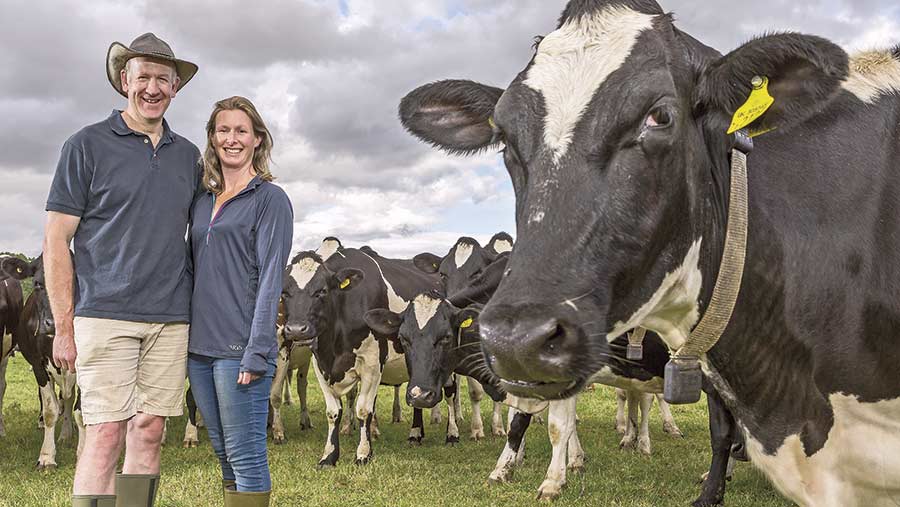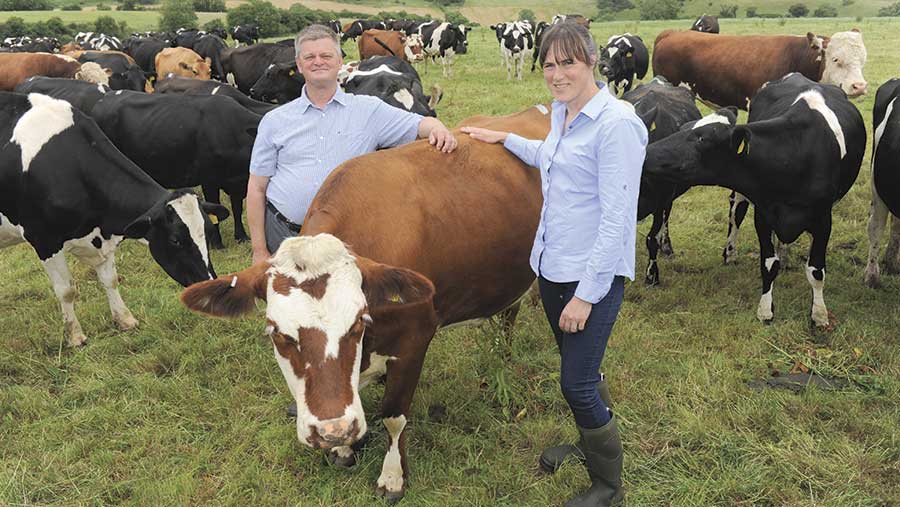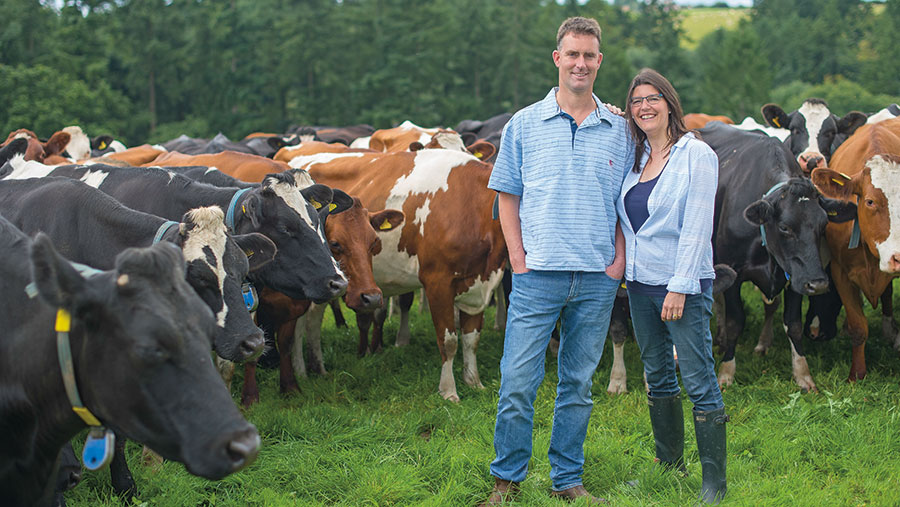2017 FW Awards: Dairy Farmer of the Year finalists
The 2017 Farmers Weekly Awards finalists have been announced and the judges have visited each of them for a three-hour interview and tour.
All three finalists are shining examples of profitable, family farms. They are all sustainable businesses making the most of their natural resources and have clear visions and goals for the future. Rhian Price reports.
See also: Book your table at the 2017 Farmers Weekly Awards night
The 2017 dairy farmer of the year finalists are:
- Tim and Louise Downes, The Farm, Longnor, Shropshire
- Neville and Suzanne Loder, The Dairy Farm, Oborne, Sherborne
- Alan and Donna Webber, Hensley Farm, Crediton, Devon
The judges are:
- Rhian Price, Farmers Weekly Livestock editor
- Ian Browne, independent farm business consultant, The Farm Consultancy Group
- Geoff Sayers, 2016 Farmers Weekly Awards Dairy Farmer of the Year
Tim and Louise Downes, The Farm, Longnor, Shropshire.

Tim and Louise Downes © Richard Stanton
Innovation
Farm facts
- Running 357ha of which 217ha is owned and the remainder contract farmed
- Milking 440 spring block-calving cows
- Producing 4,997 litres a cow at 4.05% butterfat and 3.33% protein (rolling results up to July)
- Supply 150 Angus steers and heifers to Dovecote Park each year
Organic champions Tim and Louise have grown their business exponentially in the past 12 months.
Having bought a new, 88ha unit they have increased cow numbers to 440 and soon hope to hit 500, split equally across their two Shropshire-based units. This will double their 2016 production to 2m litres.
Rather than chasing litres they are adding value to their produce by working closely with their buyers.
Through his involvement with Omsco’s board, Tim has helped develop a booming cheese export market to the US and has secured a premium for their Angus beef calves with Dovecote.
Animal health
They are grasping new opportunities by keeping an open mind. Superb stockmanship and the adoption of homoeopathy is enabling the couple to run an antibiotics-free milking herd, which provides them with a 4p/litre premium on 60% of milk sold.
The high health herd maintains rigorous vaccination and strict management protocols.
This, alongside using sexed semen on heifers, has helped them capitalise on selling surplus heifers this year, bringing in an extra 1p/litre.
Grassland management
Excellent grassland management is the beating heart of their organic system.
Cows are rotationally grazed in 12-hour shifts and over-seeding with multispecies leys has helped to boost grass quality and in turn, milk constituents and output, with yield from all forage making up almost three-quarters of total output.
Extensive soil sampling, aeration and conditioning using seaweed is helping them to grow 10t/ha of grass a year – no mean feat for a low-input system.
Technology
Tim is also deploying a wealth of digital data to inform daily decisions, including a grazing calculator app and EID tags to facilitate regular weigh ins.
Perhaps most impressive is the opportunities they are bestowing on young people. They are currently hosting their 17th gap year student.
Their herd’s manager Andy Farrow is a testament to their management skills. Having given him his first job after returning home from New Zealand, he is now running their new unit and alongside his wife Lianne.
The judges liked
- Using technology and data to inform decisions
- Not afraid to experiment
- Great industry ambassadors. Tim is a Nuffield scholar and sits on the Omsco board and RABDF committee
- Enjoy investing time in developing young people
- Harnessing natural resources to create a sustainable business
Neville and Suzanne Loder, The Dairy Farm, Oborne, Sherborne

Neville and Suzanne Loder © Hugh Nutt
New starters
Farm facts
- Yielding 5,085kg a cow at 4.55% fat and 3.5% protein, supplying Arla
- Vaccinating for bovine viral diarrhoea and leptospirosis
- Employ one full-time staff
- 42ha county council tenancy, 26ha farm business tenancy and the remainder grass keep
- Members of Wessex Springers discussion group
Through sheer grit, hard work and determination this formidable couple have overcome all odds to make a spectacular ascent up the farming ladder.
Building up a 450 flock of ewes while working full-time jobs allowed them to build up enough capital to get a foothold in dairy.
Gaining a tenancy on a small, 24.2ha Dorset county council farm in the late nineties paved the way for the dairy enterprise with the sheep sold to help finance the move.
Today, the couple have a herd of 147 cross-bred cows and acquired more land on different agreements to take the total to 104ha.
Neville says it’s fortuitous timing and their willingness to go against the grain that has been key in their success.
“We were getting into milk in 2000 when everyone else was getting out because the price was about 16-17p/litre,” adds Neville.
Although the couple lived on a “shoestring” to survive the first four to five years it did allow them to buy heifers cheap at about £350 a head.
“One of our biggest assets is we had nothing to lose.”
Breeding and feeding
The couple transitioned to spring calving in 2011 to afford them a better work-life balance, phasing out their Holstein genetics.
“We wanted to make the business work for us. I was a volunteer police officer and I have seen enough to know that life changes rapidly and you don’t get second chances.”
Heifers are mated to easy calving, Jersey-cross bulls to calve at two and the cows are AI’d to New Zealand Friesian and Jersey bulls. After six weeks, a Hereford bull is run as a sweeper.
Alongside keeping heifer calves from the most fertile cows, this strict breeding policy is helping them to achieve 90% calving within the first six weeks.
They are driving down costs by exploiting their cheapest feed resource – good-quality grass, with cows paddock-grazed from February to November and outwintered on turnips and silage bales.
Meanwhile, young calves are reared outdoors until calving at two, which has helped slash heifer rearing costs from £1,200 to £780.
Clear goals
They have a clear vision for the future and are intent on building up enough capital to allow them to retire in 15 years and are already well on their way to achieving this.
The judges liked
- Neville is giving something back to young starters by sitting on the liaison panel for Dorset County Council and is also a local NFU tenant representative
- Small business but very profitable
- Good at identifying strengths and weakness and employing people who can fill knowledge gaps
Alan and Donna Webber, Hensley Farm, Crediton, Devon

Alan and Donna Webber © Jim Wileman
Business philosophy
Farm facts
- Milking 230 autumn-calving cows, yielding 6,400kg a cow a year at 4.2% butterfat and 3.3% protein
- Supplying Omsco
- The farm has increased from 121ha to 212ha in the past five years (mostly tenanted with 10ha owned)
- Calving from September to early December
- Running a closed herd
Running an organic dairy can be expensive, but keeping tight control on costs is helping Alan and Donna Webber run an enviable cost of production of 24p/litre.
Keeping things simple to minimise labour and machinery costs is a crucial part of their philosophy.
Breeding
Alan is in charge of breeding the closed, autumn-calving herd of 230 three-way-cross cows and is using Friesians, Swedish Red and Montbeliards to maximise hybrid vigour.
Heats are detected using tail paint with cows AI’d for the first six weeks. To ensure high levels of fertility Alan is selecting heifer replacements born from cows which hold to the first service.
It is a policy that is working well. This year, 71% of the heifers conceived at first service with 92% served within 21 days. Meanwhile, 70% of cows held at first service too.
And it’s only set to improve.
“This year all the dairy heifer calves will be born in the first three weeks of breeding.”
Grassland management
The herd is yielding an impressive 480kg milk solids a cow a year with quality forage acting as the primary diet source.
Milk is produced entirely from grass during the spring (from turnout in February) and summer, with cows paddock-grazed on clover rich grass leys. About 15% of the farm’s grazing platform is formed from steep ground.
Unable to plough these fields safely they are using a three-in-one rotavator, air seeder and roller to reseed these blocks. The 76ha grazing platform is now growing 8t/ha of grass – about 90% of its original pre-organic output.
In an attempt to improve lifestyle balance and save labour they drop back to once-a-day milking come August.
Cows are housed by fully by the middle of November in cubicles and fed home-grown silage in bunkers alongside cake in out of parlour feeders.
Health and environment
Vet costs are also being kept low at 0.77p/litre by embracing alternative techniques and maintaining excellent stockmanship.
No antibiotics are used at drying off. Instead, cows receive teat sealant only and 50ml of cider vinegar is added to the drinking water.
Alan believes this, alongside the frequent application of udder mint, is helping keep mastitis rates low at 22 cases across the whole herd.
The judges liked
- Profit-focused with a tight control of costs
- Outstanding stockmanship
- Excellent grassland management
- Innovative techniques to improve sward on difficult ground
- DIY AI and achieving phenomenal submission and conception rates
Safety Revolution is sponsoring 2017 Farmers Weekly Awards Dairy Farmer of the Year
 “Given the difficult circumstances recently it is inspiring to see such fantastic businesses prospering and inspiring the industry – encouraging others to continue to strive for excellence – these are our values and as such Safety Revolution is proud to be sponsoring this category and supporting the dairy sector as a whole.”
“Given the difficult circumstances recently it is inspiring to see such fantastic businesses prospering and inspiring the industry – encouraging others to continue to strive for excellence – these are our values and as such Safety Revolution is proud to be sponsoring this category and supporting the dairy sector as a whole.”
Oliver Dale, managing director, Safety Revolution
